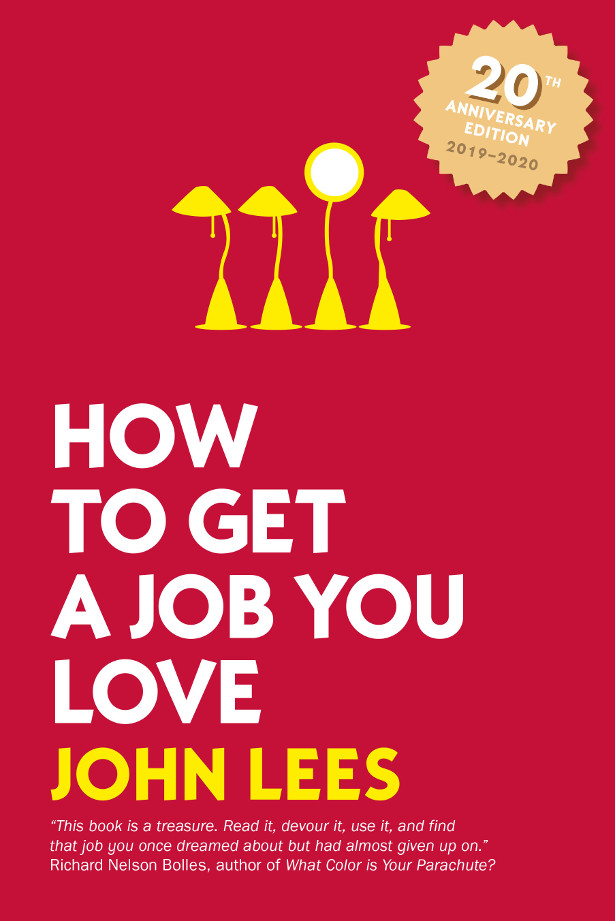TEN TIPS ON HOW TO GET A JOB YOU LOVE IN 2019 (10% Off Here)
The publishers are currently offering a 10% discount on the book here: https://www.mheducation.co.uk/9781526847140-emea-how-to-get-a-job-you-love-2019-2020-edition-group

Linkedin | Facebook | Twitter | Google+
“I know I want to do something different, but don’t know what it is!” is the most common phrase heard by career transition expert John Lees. But how do you take those first steps towards making a change to start really unlocking your hidden potential? In the 2019/20 edition of his best-selling guide, How to Get a Job You Love (McGraw-Hill, £12.99) John expertly guides readers through the job transition maze to help discover your strengths, identify your real career drivers, and provides his advice on negotiating today’s jobs market.
Here are John’s ten top tips for How to Get a Job You Love this year
1.What happened to my career? Firstly, analyse the problem. How did you get to your current role, what’s preventing you from getting a job you’ll love? How much of your career is about regret or missed opportunity? You’ve now taken the first step to change.
2.Analyse your skills. What do you do well? Review your skills, especially those acquired outside work. What skills always feel natural? What skills do you look forward to using in the workplace? List your current skills development, learning and any voluntary activities.
3.Work out your top 10 jobs criteria. Develop a wish list of the ingredients in your ideal job – think about key elements such as the kind of people you enjoy working with, the results you like to achieve and the organisation’s working style. Then throw your values into the mix – what products or services matter to you? Look for jobs which match at least six out of the 10 criteria.
4.Stock take. It’s very easy to believe that the only solution to job dissatisfaction at work is job change. Often our dissatisfaction is because there’s a mismatch between who you are and what you are doing. Review your job carefully. What parts do you actually enjoy? Make a list of what you would change if you had a magic wand, then look at what you could actually change. Sometimes the solution may just be in voicing your aspirations about what you’d like to do more of to your boss or HR.
5.Focus on the ingredients not the job title. “I’m looking for a job that involves these skills, this knowledge, and this working style”. Let people make creative suggestions rather than just responding to your stated job title.
6.What would you do if you won the lottery? Two years later after you’ve won the lottery and had some down time, if money is not the reason for working, what would you want to do if you could do anything you wanted? Taking money and status out of the picture let’s you focus on what you would like to do most of the time.
7.Mine your experience. Few people discover their dream job through career tests. Usually it’s through combining ideas and past experience. Look at what you have found stimulating in the past – in work, study or leisure – and map that into the workplace by asking about what people actually do.
8.Look before you leap. Research before you job search. Don’t rely on second-hand information, find out for yourself! Pick a couple of job ideas and ask around until you get a chance to talk to people who actually do the role. A friend of a friend, someone at the gym, or in your street. Find out what the job is really like, if they love what they do and learn to talk the language.
9.Get your message right. When you get closer to deciding what your ideal job is, learn how to present what you are and what you do in short, focused statements. Be ready to summarise your skills and know-how quickly, and say how you can help an organisation. Decide in advance what are the six most important things on an employer s shopping list, and prepare engaging stories to match.
10.Just do it! You’ve done your homework, researched the market, spoken to people who do the job and honed your message and CV, so now ask for the opportunity! Ask if you could job shadow them for a day, ring to see if they know of any opportunities and discover the ‘hidden’ job market by networking continuously, and don’t let setbacks put you off.
The new and fully updated edition of How to Get a Job You Love will challenge your perceived limitations, find your true passion and start applying it to your working life. The practical guide also looks at overcoming the blocks between you and a great career; discovering new areas of work; creative job search strategies, de-bunks job hunting myths and finding a job using social media. Key new features in this edition include fresh exercises to draw out your personal values, checklists including self-employment, new chapters and revised resources.






